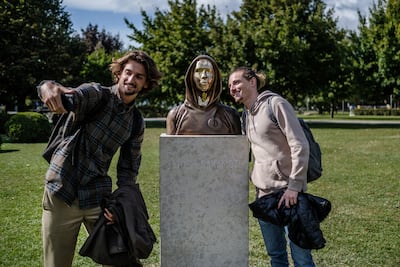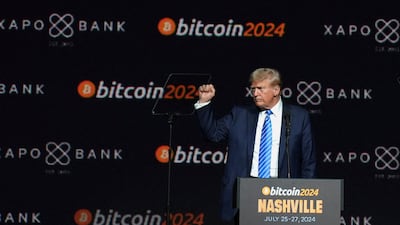The President of the United States loves Bitcoin. Donald Trump says that the cryptocurrency – invented by the mysterious Satoshi Nakamoto in 2008 – will be included in a strategic reserve of digital assets that his administration plans to create.
Bitcoin has been the most well-known and, at times highly controversial, digital asset, while the true identity of the person or persons behind Satoshi Nakamoto remains inconclusive.
Its origins are related to how, with the advent of the World Wide Web, it became easy to create digital information and, with the increasing volume of it, just as straightforward to replicate and copy all of it. The internet held the promise of easy and direct commerce between individuals. But to enable this, a problem to be solved was how to ensure rightful and legal ownership of something digital. Without a solution, a huge obstacle to the expansion of the digital economy would remain.
But just as the physical financial system went into meltdown following the failure of Lehman Brothers bank, a whitepaper Nakamoto authored was published online. It proposed Bitcoin as an incentive for ordinary people to run a system of digital payments that would not need a trusted third party – for instance, a bank – to process and handle the transactions.
Using their computer power, participants in the Bitcoin system race to solve a puzzle to verify each block in a chain of transactions. The first one to do so receives some Bitcoin as a reward for their efforts and also to compensate for any cost, including electricity. With millions of computers working to build the Bitcoin blockchain – each transaction visible to all – it would be too difficult to overpower the system and alter a transaction fraudulently. Working successfully, you would then no longer need an institution or government to guarantee anything.
It was a vision for a future financial system defined by radical transparency and equality. But since then, Bitcoin has developed supporters and detractors of matching ferocity. Its backers hold on to it for dear life through volatility and scandals, while those who oppose them fear its use by criminal networks and challenge its utility and value.
The order banned the use of any digital asset backed by other large economies trialling their use as they explore ways to reduce global dependence on the US dollar
During his election campaign last year, Mr Trump vowed to begin a new, benign era for crypto.
In January, he used his authority to issue an order “to promote United States leadership in digital assets and financial technology while protecting economic liberty”. The order highlighted how “the digital asset industry plays a crucial role in innovation and economic development in the United States, as well as our nation’s international leadership”. Most significantly, this was linked to “promoting and protecting the sovereignty of the United States dollar, including through actions to promote the development and growth of lawful and legitimate dollar-backed stablecoins worldwide”.
It also pledged “measures to protect Americans from the risks of Central Bank Digital Currencies [CBDCs], which threaten the stability of the financial system, individual privacy, and the sovereignty of the United States, including by prohibiting the establishment, issuance, circulation, and use of a CBDC within the jurisdiction of the United States”. Thus, the order banned the use of any digital asset backed by other large economies – such as China, India, Russia, Japan and the EU – that are trialling their use as they explore ways to reduce global dependence on the US dollar.
Over the past year, a consensus has formed that de-dollarisation is an unstoppable force. According to the Atlantic Council’s Dollar Dominance Monitor, “The US dollar has served as the world’s leading reserve currency since World War II. Today, the dollar represents 58 per cent of foreign reserve holdings worldwide. The euro, the second-most-used currency, accounts for only 20 per cent of foreign reserve holdings".
But the report also pointed out that in recent years – particularly since Russia’s full-scale invasion of Ukraine and the G7’s subsequent escalation in the use of financial sanctions – a number of countries have signalled their intention to accelerate efforts to diversify away from dollars.
Mr Trump has threatened these efforts, including with 100 per cent tariffs on goods from any country pursuing de-dollarisation. Simultaneously, he is closing the door on any chance of the growth of digital assets becoming a Trojan Horse to replace the dollar by championing cryptocurrencies that are unaffiliated to other nations.
“A US Crypto Reserve will elevate this critical industry after years of corrupt attacks by the [previous Joe] Biden administration, which is why my Executive Order on Digital Assets directed the Presidential Working Group to move forward on a Crypto Strategic Reserve that includes XRP, SOL and ADA,” Mr Trump added, referring to the cryptocurrencies being added to the reserve. “I will make sure the US is the Crypto Capital of the World. We are making America great again!”
Mr Trump posted on social media last weekend before following up with another one: “Obviously, BTC and ETH, as other valuable cryptocurrencies, will be the heart of the Reserve. I also love Bitcoin and Ethereum!”
Critics of the move point to conflicts of interest and also the danger of creating a bubble in these assets.
According to Yanis Varoufakis, an economist and the former finance minister of Greece, in order to accomplish his economic goals Mr Trump needs the seemingly contradictory outcomes of a weaker dollar to spur American exports, while maintaining its power as the dominant currency, which gives him political leverage over rival nations. In other words, he needs large economies to reduce their dollar holdings for the currency to be weakened, but also not seek to supplant it with another fiat currency.
By promoting Bitcoin, Ethereum and other cryptocurrencies, the US President ensures that his country’s rivals are even further constrained from challenging its financial dominance through this emerging technology.
MO
%3Cp%3E%3Cstrong%3ECreators%3A%20%3C%2Fstrong%3EMohammed%20Amer%2C%20Ramy%20Youssef%3C%2Fp%3E%0A%3Cp%3E%3Cstrong%3EStars%3A%20%3C%2Fstrong%3EMohammed%20Amer%2C%20Teresa%20Ruiz%2C%20Omar%20Elba%3C%2Fp%3E%0A%3Cp%3E%3Cstrong%3ERating%3A%3C%2Fstrong%3E%204%2F5%3C%2Fp%3E%0A
Polarised public
31% in UK say BBC is biased to left-wing views
19% in UK say BBC is biased to right-wing views
19% in UK say BBC is not biased at all
Source: YouGov
UAE currency: the story behind the money in your pockets
Ain Dubai in numbers
126: The length in metres of the legs supporting the structure
1 football pitch: The length of each permanent spoke is longer than a professional soccer pitch
16 A380 Airbuses: The equivalent weight of the wheel rim.
9,000 tonnes: The amount of steel used to construct the project.
5 tonnes: The weight of each permanent spoke that is holding the wheel rim in place
192: The amount of cable wires used to create the wheel. They measure a distance of 2,4000km in total, the equivalent of the distance between Dubai and Cairo.
The specs
Price, base / as tested Dh1,470,000 (est)
Engine 6.9-litre twin-turbo W12
Gearbox eight-speed automatic
Power 626bhp @ 6,000rpm
Torque: 900Nm @ 1,350rpm
Fuel economy, combined 14.0L / 100km
Kandahar%20
%3Cp%3E%3Cstrong%3EDirector%3A%3C%2Fstrong%3E%20Ric%20Roman%20Waugh%3C%2Fp%3E%0A%3Cp%3E%3Cstrong%3EStars%3A%C2%A0%3C%2Fstrong%3EGerard%20Butler%2C%20Navid%20Negahban%2C%20Ali%20Fazal%3C%2Fp%3E%0A%3Cp%3E%3Cstrong%3ERating%3A%3C%2Fstrong%3E%202.5%2F5%3C%2Fp%3E%0A
UAE currency: the story behind the money in your pockets
if you go
The flights
The closest international airport to the TMB trail is Geneva (just over an hour’s drive from the French ski town of Chamonix where most people start and end the walk). Direct flights from the UAE to Geneva are available with Etihad and Emirates from about Dh2,790 including taxes.
The trek
The Tour du Mont Blanc takes about 10 to 14 days to complete if walked in its entirety, but by using the services of a tour operator such as Raw Travel, a shorter “highlights” version allows you to complete the best of the route in a week, from Dh6,750 per person. The trails are blocked by snow from about late October to early May. Most people walk in July and August, but be warned that trails are often uncomfortably busy at this time and it can be very hot. The prime months are June and September.
TOP%2010%20MOST%20POLLUTED%20CITIES
%3Cp%3E1.%20Bhiwadi%2C%20India%0D%3Cbr%3E2.%20Ghaziabad%2C%20India%0D%3Cbr%3E3.%20Hotan%2C%20China%0D%3Cbr%3E4.%20Delhi%2C%20India%0D%3Cbr%3E5.%20Jaunpur%2C%20India%0D%3Cbr%3E6.%20Faisalabad%2C%20Pakistan%0D%3Cbr%3E7.%20Noida%2C%20India%0D%3Cbr%3E8.%20Bahawalpur%2C%20Pakistan%0D%3Cbr%3E9.%20Peshawar%2C%20Pakistan%0D%3Cbr%3E10.%20Bagpat%2C%20India%3C%2Fp%3E%0A%3Cp%3E%3Cem%3ESource%3A%20IQAir%3C%2Fem%3E%3C%2Fp%3E%0A
Auron Mein Kahan Dum Tha
Starring: Ajay Devgn, Tabu, Shantanu Maheshwari, Jimmy Shergill, Saiee Manjrekar
Director: Neeraj Pandey
Rating: 2.5/5
The specs
Engine: 4.0-litre V8 twin-turbocharged and three electric motors
Power: Combined output 920hp
Torque: 730Nm at 4,000-7,000rpm
Transmission: 8-speed dual-clutch automatic
Fuel consumption: 11.2L/100km
On sale: Now, deliveries expected later in 2025
Price: expected to start at Dh1,432,000
2018 ICC World Twenty20 Asian Western Regional Qualifier
Saturday results
Qatar beat Kuwait by 26 runs
Bahrain beat Maldives by six wickets
UAE beat Saudi Arabia by seven wickets
Monday fixtures
Maldives v Qatar
Saudi Arabia v Kuwait
Bahrain v UAE
* The top three teams progress to the Asia Qualifier
The five pillars of Islam
1. Fasting
2. Prayer
3. Hajj
4. Shahada
5. Zakat
AI traffic lights to ease congestion at seven points to Sheikh Zayed bin Sultan Street
The seven points are:
Shakhbout bin Sultan Street
Dhafeer Street
Hadbat Al Ghubainah Street (outbound)
Salama bint Butti Street
Al Dhafra Street
Rabdan Street
Umm Yifina Street exit (inbound)
White hydrogen: Naturally occurring hydrogen
Chromite: Hard, metallic mineral containing iron oxide and chromium oxide
Ultramafic rocks: Dark-coloured rocks rich in magnesium or iron with very low silica content
Ophiolite: A section of the earth’s crust, which is oceanic in nature that has since been uplifted and exposed on land
Olivine: A commonly occurring magnesium iron silicate mineral that derives its name for its olive-green yellow-green colour
What the law says
Micro-retirement is not a recognised concept or employment status under Federal Decree Law No. 33 of 2021 on the Regulation of Labour Relations (as amended) (UAE Labour Law). As such, it reflects a voluntary work-life balance practice, rather than a recognised legal employment category, according to Dilini Loku, senior associate for law firm Gateley Middle East.
“Some companies may offer formal sabbatical policies or career break programmes; however, beyond such arrangements, there is no automatic right or statutory entitlement to extended breaks,” she explains.
“Any leave taken beyond statutory entitlements, such as annual leave, is typically regarded as unpaid leave in accordance with Article 33 of the UAE Labour Law. While employees may legally take unpaid leave, such requests are subject to the employer’s discretion and require approval.”
If an employee resigns to pursue micro-retirement, the employment contract is terminated, and the employer is under no legal obligation to rehire the employee in the future unless specific contractual agreements are in place (such as return-to-work arrangements), which are generally uncommon, Ms Loku adds.
Roll%20of%20Honour%2C%20men%E2%80%99s%20domestic%20rugby%20season
%3Cp%3E%3Cstrong%3EWest%20Asia%20Premiership%3C%2Fstrong%3E%0D%3Cbr%3EChampions%3A%20Dubai%20Tigers%0D%3Cbr%3ERunners%20up%3A%20Bahrain%0D%3C%2Fp%3E%0A%3Cp%3E%3Cstrong%3EUAE%20Premiership%3C%2Fstrong%3E%0D%3Cbr%3EChampions%3A%20Jebel%20Ali%20Dragons%0D%3Cbr%3ERunners%20up%3A%20Dubai%20Hurricanes%0D%3C%2Fp%3E%0A%3Cp%3E%3Cstrong%3EUAE%20Division%201%3C%2Fstrong%3E%0D%3Cbr%3EChampions%3A%20Dubai%20Sharks%0D%3Cbr%3ERunners%20up%3A%20Abu%20Dhabi%20Harlequins%20II%0D%3C%2Fp%3E%0A%3Cp%3E%3Cstrong%3EUAE%20Division%202%3C%2Fstrong%3E%0D%3Cbr%3EChampions%3A%20Dubai%20Tigers%20III%0D%3Cbr%3ERunners%20up%3A%20Dubai%20Sharks%20II%0D%3C%2Fp%3E%0A%3Cp%3E%3Cstrong%3EDubai%20Sevens%3C%2Fstrong%3E%0D%3Cbr%3EChampions%3A%20Dubai%20Tigers%0D%3Cbr%3ERunners%20up%3A%20Dubai%20Hurricanes%3C%2Fp%3E%0A
UAE currency: the story behind the money in your pockets
More from Rashmee Roshan Lall
Story%20behind%20the%20UAE%20flag
%3Cp%3EThe%20UAE%20flag%20was%20first%20unveiled%20on%20December%202%2C%201971%2C%20the%20day%20the%20UAE%20was%20formed.%C2%A0%3C%2Fp%3E%0A%3Cp%3EIt%20was%20designed%20by%20Abdullah%20Mohammed%20Al%20Maainah%2C%2019%2C%20an%20Emirati%20from%20Abu%20Dhabi.%C2%A0%3C%2Fp%3E%0A%3Cp%3EMr%20Al%20Maainah%20said%20in%20an%20interview%20with%20%3Cem%3EThe%20National%3C%2Fem%3E%20in%202011%20he%20chose%20the%20colours%20for%20local%20reasons.%C2%A0%3C%2Fp%3E%0A%3Cp%3EThe%20black%20represents%20the%20oil%20riches%20that%20transformed%20the%20UAE%2C%20green%20stands%20for%20fertility%20and%20the%20red%20and%20white%20colours%20were%20drawn%20from%20those%20found%20in%20existing%20emirate%20flags.%3C%2Fp%3E%0A
Jawan
%3Cp%3E%3Cstrong%3EDirector%3A%20%3C%2Fstrong%3EAtlee%3C%2Fp%3E%0A%3Cp%3E%3Cstrong%3EStars%3A%3C%2Fstrong%3E%20Shah%20Rukh%20Khan%2C%20Nayanthara%2C%20Vijay%20Sethupathi%26nbsp%3B%3C%2Fp%3E%0A%3Cp%3E%3Cstrong%3ERating%3A%20%3C%2Fstrong%3E4%2F5%3C%2Fp%3E%0A
The specs: 2018 Audi Q5/SQ5
Price, base: Dh183,900 / Dh249,000
Engine: 2.0L, turbocharged in-line four-cylinder / 3.0L, turbocharged V6
Gearbox: Seven-speed automatic / Eight-speed automatic
Power: 252hp @ 5,000rpm / 354hp @ 5,400rpm
Torque: 370Nm @ 1,600rpm / 500Nm @ 1,370rpm
Fuel economy: combined 7.2L / 100km / 8.3L / 100km



